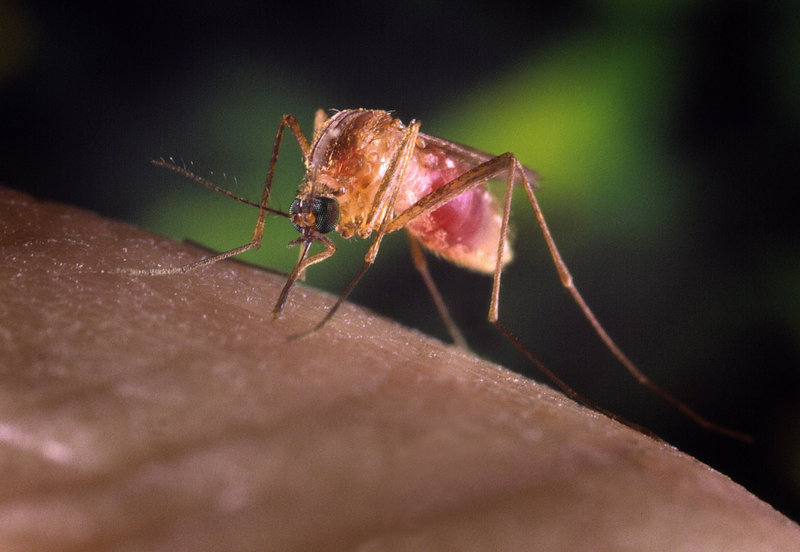The Maine Center for Disease Control and Prevention has confirmed the presence of the eastern equine encephalitis virus in a sampling of mosquitoes collected in York, the second sampling in the state to test positive for the disease this year.
An earlier sample tested positive in Alfred, also in York County, on July 16.
Dr. Sheila Pinette, director of the Maine CDC, said the Alfred test result came early in the season, but that “now is about the time we usually see them.”
Health officials expect more positive results before the mosquito season ends, possibly as late as October, depending on weather and temperatures.
Warm, wet weather would likely increase the mosquito population, but not all mosquitoes carry the virus, Pinette said.
It usually takes two or three hard frosts to kill off mosquitoes for the season, she said.
“We still have plenty of warm weather ahead in the next few weeks and this increases the possibility of additional positive (sampling) pools,” Pinette said.
Positive test results in mosquitoes do not necessarily mean that the disease will spread to humans, and there has never been a documented case of a person contracting EEE in Maine.
Several people have died of the disease in New Hampshire over the past several years.
EEE is a relatively rare virus transmitted only through the bite of an infected mosquito. It can cause serious illness in humans, large animals – particularly horses – and some bird species.
People, horses and birds with EEE are not contagious, however.
Frequent rain early this summer probably created ideal conditions for the spread of the virus in mosquitoes, Pinette said. Because mosquitoes breed in standing water, the rain could help them to breed in larger numbers.
Weather reports are forecasting warm weather for the next several days, and over the next six to eight weeks.
Pinette said people should be aware of the risk and take reasonable precautions, including avoiding mosquito-infested areas, such as wetlands, and recognizing the symptoms of the infection in humans, health officials said.
“Our goal is not to scare people,” Pinette said. “Our goal is to educate.” In announcing the findings, the state seeks to keep people informed about EEE in Maine.
The virus has been identified in mosquito pools in the region, including New Hampshire, Vermont and Massachusetts.
Two horses also have tested positive for EEE this year in Massachusetts.
In 2012, 30 pheasants in Lebanon died suddenly of the EEE virus. Another 75 pheasants in the same flock were subsequently killed to curb the spread of the disease by infected mosquitoes biting other birds in the close quarters of pens.
Maine also experienced unprecedented EEE activity in 2009, with both mosquito pools and animals testing positive for the virus, including several horses, which died from the disease, according to the Maine CDC.
Anyone living in areas where EEE has been found in mosquito pools in recent years should recognize the risk of being exposed to the virus.
Individuals younger than 15 or older than 50 years of age have the highest risk of severe illness from the disease if bitten by an infected mosquito.
The first signs of EEE usually emerge three to 10 days after infection and may include high fever (103°-106° F), stiff neck, headache, lack of energy and inflammation of the brain.
The disease gets worse quickly and some patients have fallen into comas within a week.
“EEE is a very serious illness,” said Dr. Stephen Sears, state epidemiologist, in a statement. “Mainers need to take appropriate precautions against mosquitoes to prevent this illness.”
There have been no reported cases of West Nile virus — often associated in the public mind with EEE because both are spread by mosquitoes — in Maine this year.
“We’re a little surprised by that,” said Pinette, adding that 2012 was a particularly bad year for West Nile nationwide.
The first documented case of West Nile infection in Maine was last year.
Maine CDC recommends preventive measures to protect against EEE and other mosquito-borne illnesses:
• Limit time outdoors at dawn and dusk when many species of mosquitoes are most active.
• Keep screens on windows and use screen doors to keep mosquitoes out of the home.
• Remove containers holding water in and around the home, as standing water can attract mosquitoes.
• Wear protective clothing when outdoors, including long-sleeved shirts, pants and socks.
• Use an Environmental Protection Agency-approved repellent when outdoors, especially around dawn and dusk. Always follow the instructions on the product’s label.
North Cairn can be contacted at 791-6325 or at:
ncairn@pressherald.com
Send questions/comments to the editors.


